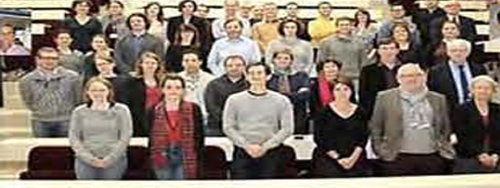Degenerative and vascular cognitive discorders

Presentation
This team, made up of clinical and pre-clinical researchers, is multidisciplinary. It is located at the interface between neurology, pharmacology and imaging. The research project is focused on the translational, transnosographic and multimodal study of cognitive disorders associated with degenerative processes or neurovascular lesions, starting from the observation that the mechanisms are entangled.
- EMOTION & COGNITION
Project
The study of the interaction between cognition and emotions allows us to better understand the expression of cognitive and emotional disorders frequently encountered in neurological and psychiatric pathologies. Thanks to the contribution of imaging techniques (fMRI and EEG), we aim to explore the neuroanatomical markers of the relationship between cognition and emotions in a transnosographic perspective. A first series of works will study the question of the increase of cognitive disorders by anxiety in neurovascular pathologies.
Team: Etienne Allart (PI), Thibaut Dondaine (PI), Florine Ruthmann, Julie Deguil, Dominique Deplanque, Anne-Marie Bordet, Nacim Betrouni, Renaud Lopes, Romain Viard
International collaborations: ConsortiumSTROKOG
Labels/Financing : FHU VasCog/Financement Santelys/ Fiancement GIRCI
Highlights
The work is based on data from local (STROKDEM) and international (STROKOG) cohorts and is under development. The first exploratory results have highlighted the involvement of a brain network specific to post-stroke anxiety involving the amygdala and the prefrontal cortex. The exploitation of these results is ongoing.
In the context of the management of post-stroke cognitive disorders, we will explore the brain bases of anxiety and attentional disorders using fMRI and EEG.
Publications
Betrouni, Nacim, Moussaoui Yasmina, Stephanie Bombois, et al.
2020 Texture Features of Magnetic Resonance Images: An Early Marker of Post-Stroke Cognitive Impairment. Translational Stroke Research 11(4). Springer US: 643–652.
Dondaine, Thibaut, Gabriel Robert, Julie Péron, et al.
2014 Biases in Facial and Vocal Emotion Recognition in Chronic Schizophrenia. Frontiers in Psychology 5: 900.
Lo, Jessica W, John D Crawford, David W Desmond, et al.
2021 Long-Term Cognitive Decline After Stroke: An Individual Participant Data Meta-Analysis. Stroke. Lippincott Williams & Wilkins Hagerstown, MD: STROKEAHA-121.
Lo, Jessica W, John D Crawford, Katherine Samaras, et al.
2020 Association of Prediabetes and Type 2 Diabetes with Cognitive Function after Stroke: A STROKOG Collaboration Study. Stroke 51(6). Lippincott Williams & Wilkins Hagerstown, MD: 1640–1646.
Lopes, Renaud, Clément Bournonville, Grégory Kuchcinski, et al.
2021 Prediction of Long-Term Cognitive Function After Minor Stroke Using Functional Connectivity. Neurology 96(8). Wolters Kluwer Health, Inc. on behalf of the American Academy of Neurology: e1167–e1179.
Tang, Eugene YH, Christopher I Price, Louise Robinson, et al.
2020 Assessing the Predictive Validity of Simple Dementia Risk Models in Harmonized Stroke Cohorts. Stroke 51(7). Am Heart Assoc: 2095–2102.
